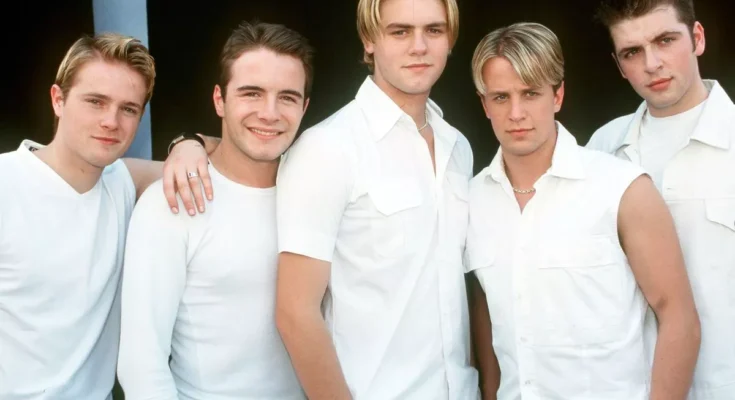Formed in Sligo, Ireland in 1998, Westlife quickly ascended to pop royalty with a string of chart-topping ballads and a vocal harmony style that charmed millions. Comprised of Shane Filan, Kian Egan, Nicky Byrne, and Mark Feehily, the band has sold over 55 million records worldwide, boasting hits like Flying Without Wings, Swear It Again, My Love, and You Raise Me Up.
But while their music and boy-next-door appeal have long been the centerpiece of their legacy, it turns out that the origin of their name has a backstory many fans are just discovering — and it’s stirring a mix of nostalgia and fascination.
The Name “Westlife”: More Than Just a Sound
For years, fans assumed that “Westlife” was simply a catchy, boy-band-style name — vaguely geographic, optimistic, and slick. But the truth is, the name actually has layered significance, and it ties directly back to the band’s Irish roots and their journey through the competitive music scene of the 1990s.
In the earliest days, the group wasn’t even called Westlife.
The Original Name: IOYOU
Before they were Westlife, the group was known as IOYOU, pronounced “I owe you.” This early version of the band included Shane, Kian, and Mark — along with three other members: Derrick Lacey, Graham Keighron, and Michael Garrett. The name IOYOU symbolized their youthful ambition and perhaps even a subconscious nod to the idea of a debt owed to the people who would eventually support them.
Despite the unique name and raw talent, IOYOU struggled to break through until their demo landed in the hands of none other than pop impresario Louis Walsh, the man behind Boyzone. Recognizing potential, Walsh brought in Simon Cowell, who suggested trimming the group and reshaping their identity entirely — including a name change.
From IOYOU to Westlife: The Rebranding That Changed Everything
When Cowell and Walsh came onboard, they recommended a major rebranding. Three of the original members were replaced with Nicky Byrne and Bryan McFadden, forming the five-member lineup that would eventually become Westlife.
But they didn’t start using the name “Westlife” immediately. In fact, they initially adopted the name Westside — a reflection of their Irish “west coast” origin and possibly a nod to their identity as proud Western Europeans entering the pop music fray.
However, upon discovering that a number of American acts were already using the name “Westside,” legal concerns forced the band to change it again. That’s when “Westlife” was born — a seamless evolution of the original concept but with a more unique and aspirational tone.
What “Westlife” Really Means
The name “Westlife” carries layered symbolism that speaks to the band’s ethos. “West” reflects their Irish heritage — all of the members are from the western counties of Ireland, particularly Sligo and Dublin. It’s a geographical anchor to their origin story.
“Life,” on the other hand, adds a sense of vitality, journey, and emotional resonance — themes that would come to define their music. Their ballads often spoke of love, loss, hope, and perseverance, mirroring the emotional arc of life itself. In essence, “Westlife” suggests “a life from the West,” or perhaps even “a life shaped by the West” — tying identity, emotion, and geography into one concise label.
It’s a name that, though unintentionally deep at first, aged gracefully with the group and grew to perfectly suit their legacy.
Fan Reactions to the Revelation
The realization that Westlife was once IOYOU and then briefly Westside before settling on their iconic name has sparked a wave of astonishment and reflection among fans online.
Many longtime followers have shared their surprise on social media, saying things like:
- “I can’t believe I’ve loved them for over 20 years and never knew they were called IOYOU first!”
- “Westside? That sounds like a rap group — Westlife definitely suits them better.”
- “Suddenly their name has so much more meaning now that I know it’s tied to Ireland and their beginnings.”
The rediscovery of these early facts has added new depth to the band’s history, reminding fans that even the most legendary groups often begin with humble, uncertain steps.
A Testament to Reinvention
The story of Westlife’s name change is more than just trivia; it’s a testament to the importance of reinvention and branding in the music industry. While raw talent was undoubtedly the band’s foundation, smart management, marketing, and a name that resonated with global audiences helped catapult them to international stardom.
In hindsight, IOYOU may never have had the staying power, and “Westside” could have led to legal headaches or cultural confusion. But “Westlife”? It became a brand, a legacy, and a household name.
Conclusion
As fans now uncover the meaning behind Westlife’s iconic name and their origins as IOYOU, it adds a nostalgic and inspirational layer to their story. It reminds us that even global superstars have beginnings rooted in experimentation, change, and a little bit of serendipity.
For Westlife, what began as a dream among Irish teens eventually blossomed into a lifelong journey that touched hearts across the globe — and their name, once just a label, now feels like a perfect summary of their enduring legacy.



